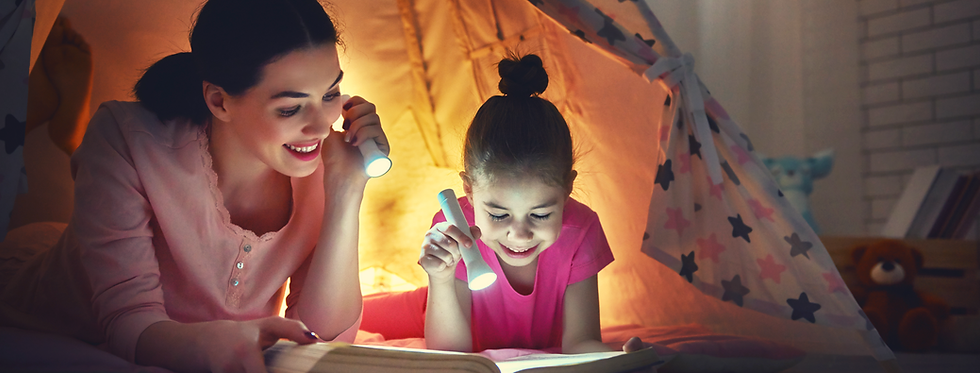Did you know...Your baby's nightlight could be affecting their sleep?
- Georgina Keltie

- Aug 26, 2020
- 3 min read

As a mummy myself, I had never thought to question some sleep aids on the market, especially from big brands, and I suspect many other parents feel the same, so I want to share with you some sleep knowledge that may come as a bit of a shock to you!
Would you be surprised if I said, some nightlights are likely to be inhibiting sleep rather than solving the problem?
Here is how and why...
Different spectrums of light can affect our ability to sleep, but BLUE light does so more powerfully, and colours on the white spectrum have similar affects. These light spectrums are found in natural daylight to give us energy and mental focus, so as natural light fades, the sleep hormone Melatonin is released in the brain, helping us to relax and set up our bodies to sleep. Artificial blue/white light suppresses natural melatonin production keeping us alert, tricking the brain into daylight mode.
We should be mindful that a baby and child's eyes and brain are more sensitive than that of an adult and are developing, so even a small amount of exposure to this type of light before and during bedtime can create alertness, night wakings, and interfere with circadian rhythms (our natural body clock).
In a nutshell, the kind of light you expose your baby, child, even yourself too, before and during bedtime is a vital tool to sleeping well. There are many opportunities that we come across blue light;
Screens - TV | Phones | Laptops | Tablets
Artificial lighting; (Certain) Light bulbs - LED Fairy Lights | Nightlights | Projectors | Torches
Baby & children's items (some) - Toys | Interactive Books | Light Up Teddies | Cot Mobiles
I cannot tell you how frustrating it is when products have a blue light feature that is meant for a child's bedtime!
What light can be used?
No light would be the best scenario as any light is distracting, however, if your child isn't a fan of the dark, or you are using light during the night for feeding/nappy changes, then the best light to use would be from the RED spectrum, a warm, gentle red or orange light is calming and soothing. I would suggest keeping the light as dim as possible, so check if you can adjust the light.
Preparing your baby/child for sleep
Exposure to daylight and fresh air during the day (between naps) helps to regulate the body clock for sleep, boosting mood and alertness in the day.
Using a blackout blind/curtains in their sleep environment, even doubling up with a travel blind is brilliant for cutting out natural rays during the day and avoiding early sunrises.
Avoid TV | screens, at least an hour before bedtime, but the longer the better.
Be aware of the lights you use at home before bedtime - bathrooms tend to have very bright lights so if this is the case, be mindful if bathtime is close to bedtime.
If you have a nightlight that is blue, check the settings and turn it off or change the colour to a warm colour.
Do your research before buying a product, check reviews and ensure it is safe.
Whilst there are likely other factors that could be disturbing your child's sleep, you can now avoid a light that chemically interefers with sleep. By being aware and understanding some of the science behind sleep is a step closer to a better night for both babies and parents.
If you have questions about your little ones sleep, drop me an email at Georgie@dreamylittlesleepers.co.uk to find out how I can help. You can also find more sleep tips on my Facebook and Instagram pages.
.png)



Comments